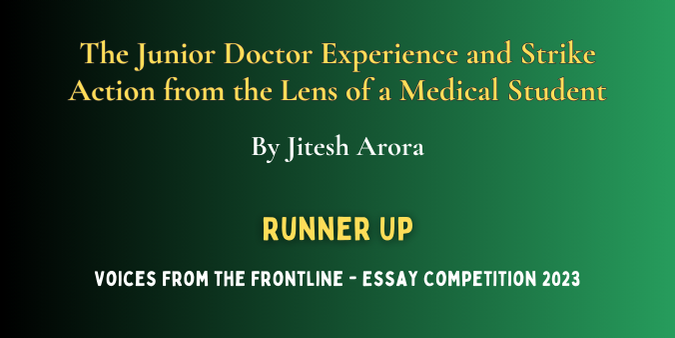
Published November 14, 2023
By Jitesh Arora
Runner up in the “Voices From the Frontline” Essay Competition 2023The National Health Service (NHS) in the United Kingdom stands as a symbol of dedication and compassion in the field of healthcare. It is a system driven by the unwavering commitment of its healthcare professionals, particularly its “junior” doctors. These doctors, often on the frontlines of patient care, have faced their own set of trials and tribulations. The NHS, though a source of pride and perseverance, has been fraught with issues such as overwork and underpayment, leading to recurrent strike action by doctors throughout the UK. In this essay, I look to explore the experiences of these junior doctors, delving into the impact of their strike action throughout 2023, primarily focussing on the most recent “Christmas Day Cover” strikes on October 2nd – 4th, 2023, and examining the ripple effect this has had on patients, their families, as well as allied healthcare professionals.
As a final-year medical student, I am currently on the cusp of transitioning from the relatively relaxed life of a student to the intense, pressured life of a working healthcare professional. The path to becoming a doctor is a challenging one, marked by years of rigorous education and training. By the end of my fourth year, we had covered the entire undergraduate medical curriculum, building a strong foundation in medical theory and practical skills. For me, the final year involves rotations in medicine, surgery, emergency medicine, and general practice. During these rotations, I am tasked with shadowing a foundation year 1 doctor and following their rota, effectively stepping into their shoes, gaining first-hand experience into the daily life of a doctor (spoiler – the job is tough). It was during this phase that I found myself in a unique situation, one that would shape my understanding of the NHS junior doctor experience.
The “Christmas Day Cover” strikes, organised by the British Medical Association (BMA), were a turning point in the history of the NHS. These strikes, unlike any before, brought junior doctors and consultants together, sending a powerful message about the gravity of the issues they faced. In essence, the strikes sought to reduce staffing levels to those of a typical holiday, akin to a Christmas Day or weekend. Doctors scheduled for “on call” duty on nights, twilights, long days or holding pagers (bleeps), were expected to work during these strikes. However, some departments that maintained consistent staffing throughout the year, such as certain emergency departments, required their staff to work as well.
During the “Christmas Day Cover” strikes, I was on my medicine rotation, specifically placed on the gastroenterology ward. My foundation year 1 doctor, whom I was shadowing, was scheduled to work “long days” during these strikes, necessitating my presence as well. During this period, the gastroenterology department operated with, at most, one-third of its typical staffing levels. It was a trying situation, but the commitment of some consultants who chose not to strike helped alleviate the strain on the doctors mandated to work during the strikes.
Almost overnight, I was entrusted with responsibilities akin to those of a foundation year 1 doctor.
The severe understaffing led to an assessment of my competencies by the medical team. With a month of experience on the gastroenterology ward, I felt relatively confident in preparing patient notes, conducting examinations, and recognising signs of deterioration in patients. Almost overnight, I was entrusted with responsibilities akin to those of a foundation year 1 doctor. I was tasked with documenting patient notes, tracking investigation results (including blood tests and imaging), and coordinating with different departments as required. In a matter of hours, I had transitioned from being a medical student to becoming a doctor, albeit under close supervision and with my grade clearly marked on all my documentation.
The experience during the strikes revealed several crucial lessons. Firstly, it emphasised the undeniable care that doctors have for their patients. Despite the strikes being a response to overwork and underpayment, the commitment to patient care remained unwavering, with some doctors voluntarily coming in to work during the strikes. Secondly, it underscored the power of teamwork and effective communication in healthcare. Despite being severely understaffed, the team banded together to ensure that all patients received timely care and assessment. There was no waiting for a medical emergency to prompt action; every patient was attended to. Thirdly, it demonstrated the ability of medical students like me to step up to the role of foundation year 1 doctors. Whilst the transition from being a student to a qualified doctor may appear daunting, my experience during the strikes showed that it is achievable with the right support and guidance.
It is essential to recognise that the strikes were not an act of selfishness but a plea for better working conditions and fair compensation, understanding that overworked and underpaid healthcare providers cannot deliver the best care to their patients.
The strikes also provided a glimpse into the daily lives of healthcare professionals and the conditions that led to such drastic actions. Striking was not a decision that was made lightly, but a response to the immense pressure and challenges faced by these dedicated individuals in their daily work. It is essential to recognise that the strikes were not an act of selfishness but a plea for better working conditions and fair compensation, understanding that overworked and underpaid healthcare providers cannot deliver the best care to their patients.
Throughout the strikes, the dedication and compassion of healthcare professionals remained unshaken. Even during the strikes, patient health remained the top priority. Doctors and nurses continued to provide the best care possible, ensuring that patients were not left unattended or deprived of the care they needed. This commitment to patient well-being reflects the core ethos of the NHS, and it is crucial to acknowledge and appreciate the sacrifices made by healthcare professionals for the greater good of our healthcare system.
However, the impact of the strikes extended beyond the healthcare providers. Despite best efforts, patients and their families were inevitably affected by the reduced staffing levels and the strikes themselves. The strikes heightened anxiety and uncertainty for patients and their loved ones, who were already grappling with the stress of illness.
The strikes also placed additional responsibilities on allied healthcare professionals, who had to shoulder the burden of their absent colleagues. This dedicated group, including nurses, pharmacists, radiographers, and various support staff, played a vital role in maintaining the continuity of care for patients. They faced increased workloads and had to adapt to rapidly changing circumstances whilst dealing with their concerns about the ongoing strike action. Their commitment to patient care in the face of adversity deserves recognition and respect.
The strikes were a powerful statement from a group of healthcare professionals who have long been committed to their patients but felt they could no longer bear the weight of an untenable system.
The issues of overwork and underpayment within the NHS are fundamental to understanding the reasons behind the strikes. Junior doctors, like the rest of the NHS workforce, experience gruelling work hours and substantial workloads. Many are required to work beyond their contracted hours, leading to fatigue and burnout. The underpayment issue is two-fold. Firstly, junior doctors have had to contend with a below-inflation pay increase, leading to a decline in real earnings. Secondly, the current remuneration structure does not adequately compensate them for the hours they put in and the responsibilities they shoulder. The combination of these factors has culminated in discontent and frustration amongst junior doctors, leading them to seek improved working conditions and fair compensation. The “Christmas Day Cover” strikes reflected this frustration and the need for change. Junior doctors, backed by the BMA, demanded a re-evaluation of their contracts, focussing on fair pay, reasonable working hours, and a safer work environment. The strikes were a powerful statement from a group of healthcare professionals who have long been committed to their patients but felt they could no longer bear the weight of an untenable system.
In conclusion, the “Christmas Day Cover” strikes of October 2023 offered a unique and poignant perspective on the NHS junior doctor experience. These strikes were not merely an expression of dissatisfaction with the status quo but a resounding call for change. It brought to light the overwhelming challenges faced by healthcare professionals in their daily lives – challenges that encompass not only long and gruelling hours but also the emotional and physical toll of caring for patients under immense pressure. These strikes laid bare the systemic issues of overwork and underpayment that have been simmering beneath the surface for years, affecting not just junior doctors but the entire healthcare ecosystem.
It is vital to recognise the commitment and sacrifices that doctors, nurses, and other healthcare professionals make every day, not only during strikes but in their ongoing battle to provide the best care possible for their patients.
My personal experience during the strikes became a vivid testament to the resilience and dedication of healthcare professionals. It showcased the unwavering commitment to patient care, even in the face of adversity. The NHS has always stood as a symbol of compassionate care, and these strikes reflected the sacrifices made by its healthcare providers. It is vital to recognise the commitment and sacrifices that doctors, nurses, and other healthcare professionals make every day, not only during strikes but in their ongoing battle to provide the best care possible for their patients.
The voices from the frontlines of the NHS junior doctor experience must be heard and heeded. Their experiences contribute significantly to the ongoing dialogue on healthcare reform. These strikes emphasise the pressing need for better working conditions and equitable compensation within the healthcare sector. They draw attention to the fact that overworked and underpaid healthcare providers can only offer compromised care, ultimately affecting patient outcomes.
As a final-year medical student, I have gained profound insights that will inform my future as a doctor. This experience has been a reality check, offering a glimpse into the immense dedication required of healthcare professionals and the challenges they face daily. It is my hope that I can use this experience to inspire and encourage fellow medical students as they transition into their roles as qualified doctors. The path to becoming a healthcare professional is not without its challenges, but it is also a path of immense rewards and the opportunity to make a meaningful difference in the lives of patients. By sharing these experiences, we can better prepare the next generation of healthcare providers, equipping them with the understanding and empathy necessary to deliver the highest quality care to those who need
it most.






